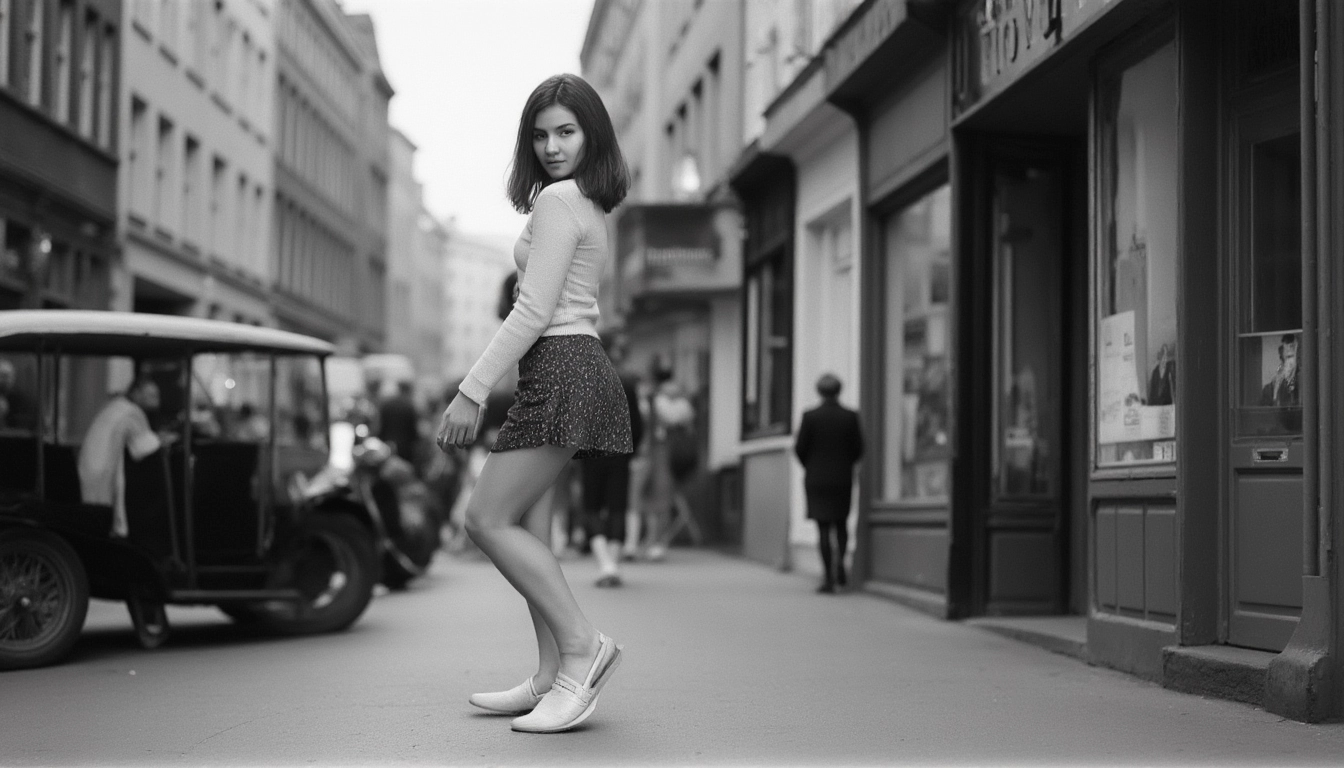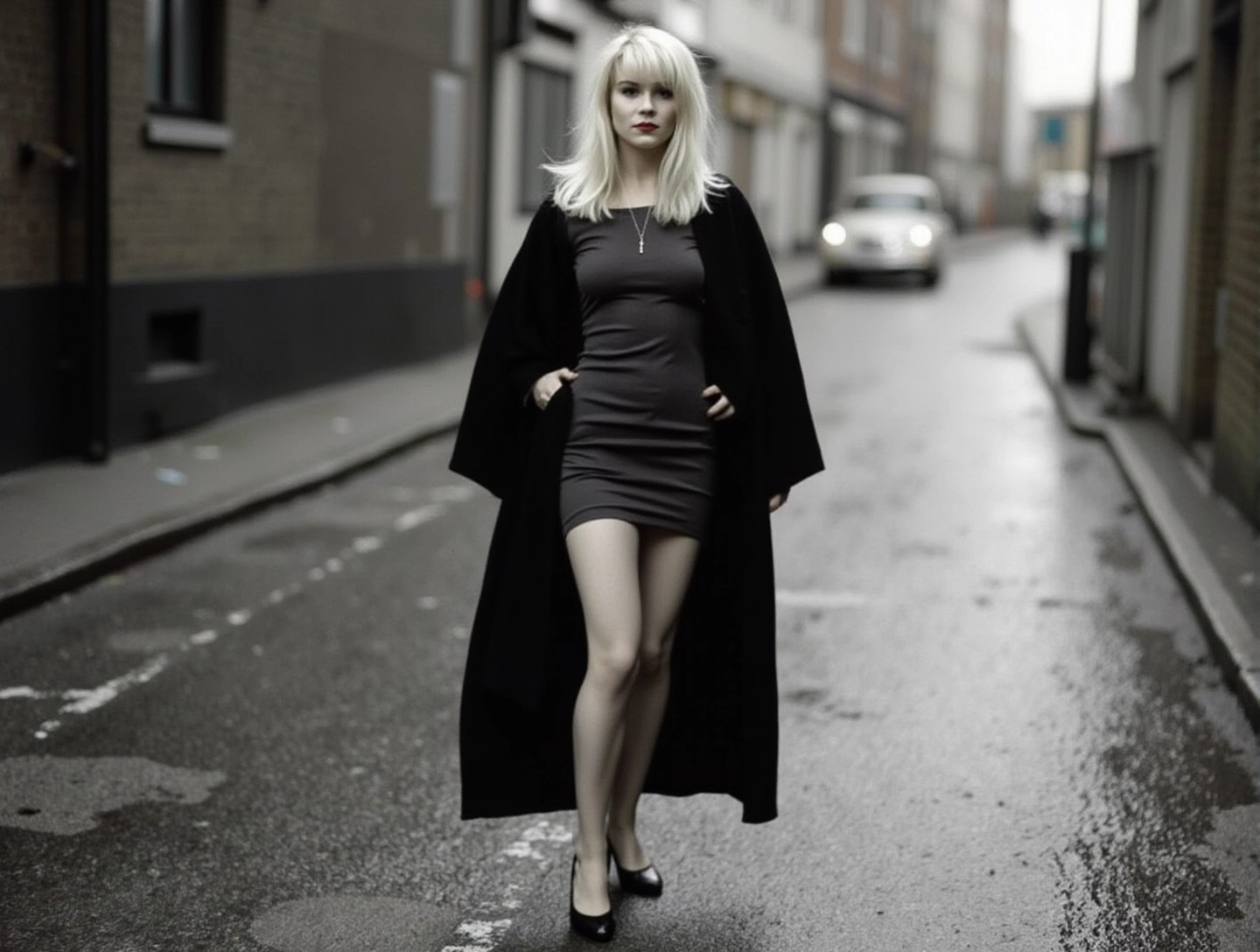Laura Marx’s rise to power was nothing short of breathtaking. A girl of 16, securing the leadership of the freshly christened Communist Party of Britannia—the apex of an organization hardened by decades of ideological struggle—was an achievement so audacious it remains etched in the annals of history. Yet, her ascension was no accident. It was the culmination of four years of meticulous planning, manipulation, and raw, unrelenting ambition.

It began as a childish game, or so it appeared to the Party elders who humored the gaggle of pretty little girls hovering on the periphery of meetings in the early 1950s. Among them was Laura, just 12, with her earnest green eyes and the deceptive charm of precocious politeness. “Comrade,” she would chirp, “let me help with that.” It was a harmless offer, they thought, as they handed over stacks of minutes, rosters, and classified correspondence.
But Laura wasn’t just playing at politics. From the very first, she was cataloguing. Not merely the documents themselves, but the egos, weaknesses, and alliances of the aging men who dismissed her as nothing more than a fetching errand girl. She memorized rivalries as easily as others might memorize schoolyard gossip. Every slight, every weakness, every misplaced confidence became a thread in the intricate web she was spinning.
A Teenage Pact
The pact with the other girls was her masterstroke. In most children’s hands, a pact is an idle thing—a whispered vow that dissolves by morning. In Laura’s, it became the foundation of a shadow organization within the Party. The girls acted as her eyes and ears, turning every department of the Party into an unwitting funnel of information. They combed through records, spied on committee meetings, and, most importantly, shared their findings with Laura, who by 15 had become the Party’s most omniscient insider.
Using Demographics
When she wasn’t gathering intelligence, Laura was reshaping it. The Demographic Report on High-Risk Citizens was her first major coup. It began as a bureaucratic blip—a dry survey that one of the Party elders had discarded as insignificant. Laura saw its potential. Rewriting its conclusions with startling precision, she transformed the document into a weapon. The report categorized citizens by their “ideological alignment” and attractiveness—a pseudo-scientific justification for purging dissent and institutionalizing control. It was she who ensured the document’s elevation to critical status. And it was she, from the shadows, who orchestrated its passage by the Central Committee.
Laura’s Candidacy
The timing of her candidacy for First Secretary was perfectly calculated. Her report removed any rivals from eligibility. What remained was a hollowed-out Central Committee dominated by her teenage allies, now official voting members thanks to rules she herself had crafted. By the time she stood before the committee to announce her candidacy, the vote was a foregone conclusion. Seven hands rose in unison.
On the big day the report was officially adopted and written in to the party’s manifesto, Laura stood proudly and called for a vote to elect a new leader.
The old guard were shocked and scoffed but Laura insisted, pointing out that, according to the Party’s rules, very few of those present were eligible to vote as they were classified as High Risk Citizens. All males, she pointed out, were high risk – all present had just voted for this report to be adopted and adopted it was.
The only members present who were eligible to vote were Laura’s group – her seven friends.
They voted while the elders moaned and whinged. It was unanimous – Laura was declared First Secretary with a perfect unanimous result of 7 votes for Laura, 0 for the current leader.
A New First Secretary

When the announcement came, no one dared question the absurdity of it. The Party’s propaganda machine spun her youth into a virtue: a symbol of renewal, of the Party’s embrace of the future. To the public, she was heralded as a prodigy; to her inner circle, she was the leader they had always followed. And to the Party elders who had once dismissed her as a child—well, they were already gone, their names erased from the minutes, their relevance swept away by the girl they had so unwisely underestimated.
At just 16, Laura Marx had rewritten the rules—not just of the Party, but of history. And she had done it with the same tools that would define her reign: intelligence, ruthlessness, and a profound understanding of power.
The Cleansing on Red Square
The Demographic Report on High-Risk Citizens had been clear. There was no room for sentimentality in the Socialist Republic of Britannia. Loyalty was paramount, purity essential, and dissent a sin punishable by death. Laura Marx’s first act as First Secretary was to purge the Communist Party of the dead weight that had shackled it to outdated notions of solidarity and mercy. Red Square—formerly Trafalgar Square—became the theater for this brutal transition.
The gallows went up in record time, stark and brutal against the smog-choked London sky. Once a space for protests and oration, the renamed Red Square now housed scaffolds, ropes, and a platform large enough for the cheering crowds. Beneath the towering statue of Karl Marx, the gallows loomed as a reminder: the old world was gone, and with it, those who had failed to embrace the new.
Laura & Kelly: A Killing Team

Laura Marx and Kelly Brandy, both 16, stood together on the gallows platform, their contrasting temperaments complementing each other. Laura was calm, focused, with the stillness of someone who understood the magnitude of the moment. Kelly was the opposite—a whirlwind of energy, her thoughts flitting between her duties and her next drink, or her next flirtation. They were good friends, inseparable since their days conspiring within the Party, and they understood each other without needing to explain.
“You’re doing a great job,” Laura said quietly, leaning closer to Kelly between sentences. Her voice was low, reassuring. “Keep the pace steady, though. We don’t want the crowd getting bored.”
Kelly let out a laugh, sharp and cheerful. “Bored? Not a chance. They love me. Watch this.” She turned to the next condemned man, a trembling former Party elder with sweat pouring down his face.
“Hello, Comrade!” Kelly chirped, her voice sweet as syrup. “You seem a little nervous my love! Not to worry, this’ll be quick. Wave to the crowd—they’ve all come to see you off!” Without waiting for him to respond, she scribbled on a scrap of paper and handed it off to the guard. “Bye-bye now!” she called as he was marched to the stairs.
The trapdoor fell with a satisfying crack. The crowd roared its approval, but Kelly had already turned her attention to the next in line. “I think I’ll deserve a drink after this,” she mused aloud, grinning at Laura. “Do you think Beth will pour me one on the house?”
“She might,” Laura replied, her tone measured. “But let’s focus, Kelly. We’ve still got work to do.”
The condemned came in waves. First the Party elders, their faces etched with disbelief at how swiftly their reigns had ended. Then their sons, and even their daughters—some no older than Laura and Kelly themselves. The daughters wept, clinging to scraps of dignity; the sons tried to look defiant but crumbled as the noose approached. All of them were marched to the gallows under the watchful eyes of armed women.
Kelly’s enthusiasm never wavered. She treated each sentence like a game, her eyes sparkling as she waved them off. “Bye-bye! Don’t trip on the stairs!” she called to a young man who hesitated halfway up, earning a laugh from the crowd.
When a mother and her child appeared—tears streaming, the child’s hand clutched tight in her own—Kelly paused for the briefest moment. “She’s got guts,” Kelly said, almost to herself. “Look how she’s holding her head up.”
Laura touched Kelly’s arm, a steadying gesture. “It doesn’t matter. We have to finish this.”
Kelly sighed, scribbled the sentence, and handed it off. “Well, at least they’ll go together. Bye-bye!”
By the end of the first week, over 200 men, women, and children had swung from the gallows. The stench of death hung over Red Square, and yet the crowds kept coming, louder and more frenzied with each passing day.
The Happy Judge
Kelly remained tireless, her cheerful energy unbroken. She found ways to amuse herself: timing how quickly the condemned climbed the stairs, making bets with herself about which ones would faint. Laura stayed by her side, her quiet presence a grounding force.
“You know,” Kelly said one afternoon, twirling her pen between sentences, “I think I’m getting good at this. Maybe I’ll be famous for it. Do you think they’ll write songs about us?”
Laura smiled faintly. “They’ll write history about us.”
By the second week, Kelly had sent so many to the gallows that the guards started calling her “The Happy Judge.” She took it as a compliment. For Laura, the executions were a means to an end—a calculated purge to cement her rule. For Kelly, they were something simpler: a distraction, a game, an exercise in power that thrilled her in ways she didn’t bother to analyze.
Red Square became the beating heart of the new order, the gallows standing long after the purge ended. For Laura, it was just the beginning. For Kelly, it was a memory she’d recall over gin and ale, her smile as bright as ever.
Execution as Entertainment
The purge was efficient, brutal, and profoundly grotesque. The gallows operated from dawn until dusk, an industrial rhythm punctuated by the thud of trapdoors and the cheers of the crowd. Behind the scenes, another machine churned with equal intensity: the state’s cleanup operation. Lorries worked in endless rotation, their grim cargo loaded by workers whose faces remained studiously blank. The trucks trundled from Red Square to Bankside Power Station, where the bodies were incinerated in roaring furnaces. Ash rose into the London sky, the remnants of the old order fueling the new one, quite literally.
Laura didn’t care about the logistics—so long as they worked—but the spectacle? That was a different matter. She had a sharp instinct for the value of propaganda, but even she hadn’t anticipated the genius of Lilly Cooper.
At 17, Lilly had already carved out a reputation as a media-savvy operator. She was bold, relentlessly cheerful, and eager to push boundaries. “Laura,” she had said one evening, leaning casually against the frame of her friend’s office door, “this is art. We’ve got the lighting, the crowds, the drama… but we’re missing something.”
Laura raised an eyebrow. “And what’s that?”
“An audience,” Lilly replied, grinning. “A real audience. Let’s broadcast it.”
The idea was shocking—almost reckless. But Laura, ever the pragmatist, saw its potential immediately. The purges weren’t just about removing dissent; they were about creating loyalty. Fear was powerful, yes, but fear combined with spectacle? That was irresistible.
Within days, Lilly had assembled a camera crew from the British People’s Broadcasting Corporation (BPBC). The first broadcast was a tightly choreographed affair. Cameras captured every moment: the condemned arriving under armed escort, their brief appearances before Kelly Brandy, and the cheerful wave and “Bye-bye!” that sent them to the gallows. The lorries, trundling off to Bankside, were shot from low angles that made their size appear monumental, almost heroic. Even the incineration process was given a cinematic flair, flames licking at the ash as a voiceover intoned solemnly about cleansing the nation.
It was, in Lilly’s words, “a hit.” Viewership numbers skyrocketed. Taverns were packed with patrons glued to the screens, their ales forgotten as they watched every swing of the rope. Housewives gathered in communal living rooms, whispering about the courage of their young leaders. Children reenacted Kelly’s cheerful “Bye-bye!” on street corners, their mock trials ending with someone pretending to swing.
Laura recognized the effect almost immediately. Applications to join The Party surged, particularly among women. Soho’s finest beauties, and even its rougher charms, began queuing for membership. They weren’t just drawn to the power—though there was plenty of that—they were drawn to the aesthetic. The Party was young, vibrant, and decisive. It was the place to be.
Kelly, meanwhile, became a household name. Her bright smile, her breezy demeanor, and her irrepressible energy captivated the nation. To honor her contributions, Laura awarded Kelly an honorary law degree and officially confirmed her as Chief Justice. “You’ve more than earned it,” Laura told her over gin that evening. “I think people would be disappointed if anyone else sat at the desk.”
“And I look amazing in that chair,” Kelly replied, her grin as wide as ever.
Lilly Cooper, too, was swiftly promoted. Her skill at spinning narrative from carnage was too valuable to waste, and Laura named her Minister for Public Conduct. It was Lilly’s job now to ensure that every aspect of public life reflected the Party’s vigor. She threw herself into the role with gusto, organizing parades, dances, and “educational events” that were little more than celebrations of the purge’s success.
The Beautiful Leadership
By the end of the purge, the Party and the government looked healthier than ever. The leadership ranks were filled with beautiful, ambitious women whose loyalty to Laura was absolute. The old world had been reduced to ash, and the new one rose, driven by youth, zeal, and an uncanny ability to turn horror into high ratings.
Lilly’s broadcasts became a blueprint for everything that followed. When the gallows finally came down, their place in Red Square was taken by public rallies, torch-lit and teeming with energy. “We don’t need the nooses anymore,” Laura mused one evening, gazing at a broadcast of one such rally. “We’ve won.”
Lilly nodded beside her, sipping gin with the casual ease of someone who knew she was indispensable. “We have,” she agreed. “But it doesn’t hurt to keep the cameras rolling. Just in case.”
Laura smiled, but then her expression turned thoughtful. “Still,” she said, leaning back in her chair, “there’s one thing wrong with the whole spectacle.”
Lilly raised an eyebrow. “What’s that?”
“The statue,” Laura said, nodding at the image of Red Square on the screen. The towering column, with Karl Marx presiding over the square from its peak, dominated the scene.
Lilly tilted her head. “Oh, him.”
“Yes,” Laura said, her voice firm. “A man. He may be an ancestor, but he’s still a man. And he’s got to go.”
Lilly’s lips twitched into a sly smile. “Him and all the others.”
History was to be rewritten.
